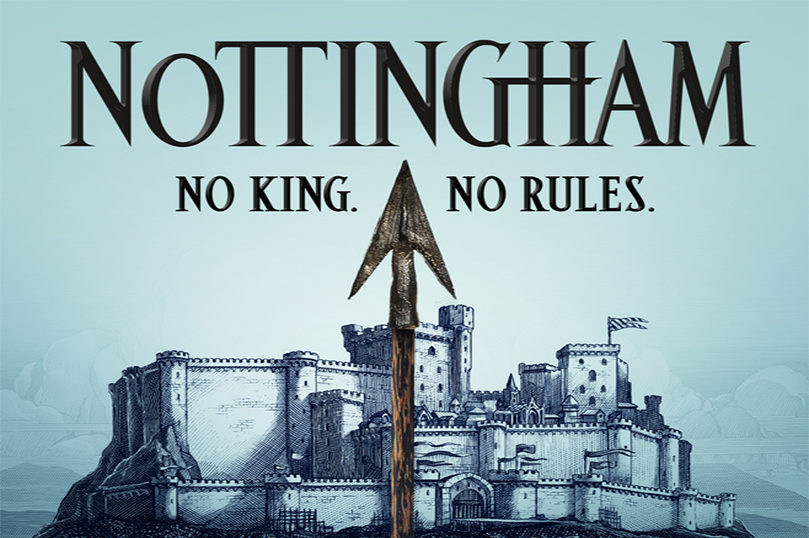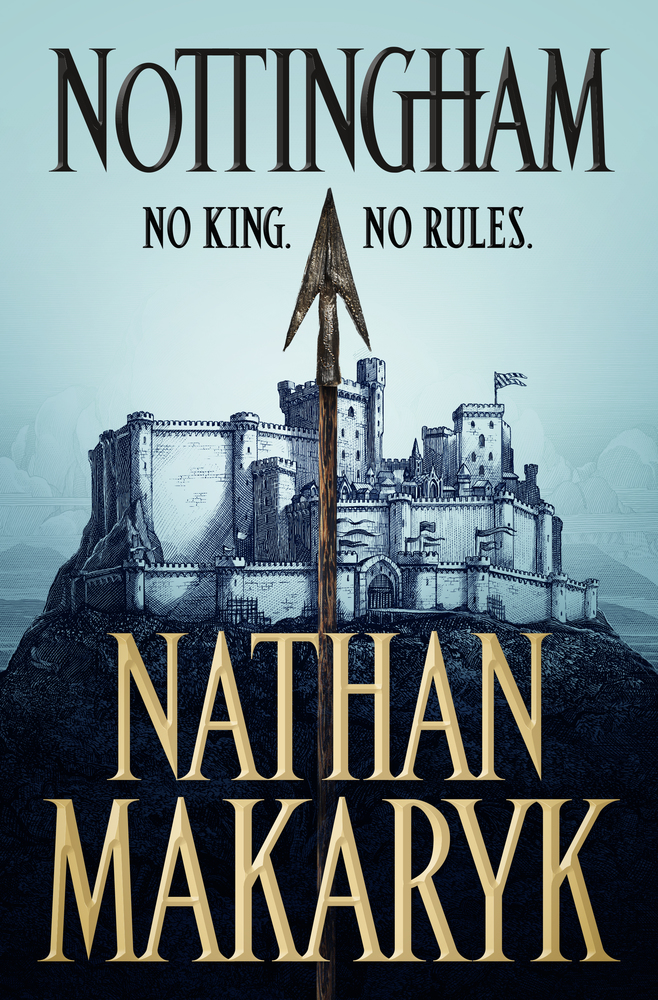England, 1191. King Richard is half a world away, fighting for God and his own ambition. Back home, his country languishes, bankrupt and on the verge of anarchy. People with power are running unchecked. People without are growing angry. And in Nottingham, one of the largest shires in England, the sheriff seems intent on doing nothing about it.
As the leaves turn gold in the Sherwood Forest, the lives of six people—Arable, a servant girl with a secret, Robin and William, soldiers running from their pasts, Marion, a noblewoman working for change, Guy of Gisbourne, Nottingham’s beleaguered guard captain, and Elena Gamwell, a brash, ambitious thief—become intertwined.
And a strange story begins to spread . . .
Both a gripping historical epic and fascinating deconstruction of the Robin Hood legend, Nathan Makaryk’s Nottingham mixes history and myth into a complex study of power—one that twists and turns far beyond the traditional tale of Sherwood Forest’s iconic thief.
Two
Robin of Locksley
English War Camp, Acre
That measly twinkle was the city of Acre, transformed by the distance into a faint collection of fiery pinpricks, barely visible in the night. Robin raised his hand up until the entirety of the foreign city sat on the base of his thumb. Such a small thing from here, such a tiny little parcel of planet, but somehow the center of everything. In the last few months the city had withstood assaults from a dozen armies, each of which had failed and crawled home as wretched, unlovable failures. Sadly for them, only one country could be England. The French and Austrian armies still lingered, rightfully predicting that England’s arrival would change the tide and bring Acre to its knees.
“But the poor city,” Robin said gravely, “never expected an attack . . . from above.”
And his forefinger came down to meet his thumb, quietly snuffing the city out of existence.
“I don’t think that worked,” William chuckled beside him. “I can still see it.”
“That’s always been your problem.” Robin kept one eye closed, rubbing his fingers together to grind the city’s walls to rubble. “Perspective.”
He smashed the city’s gates, he scraped the towers to the ground with his fingernail, he flicked the arrogant soldiers from the walls into the clouds above. For over a week, King Richard’s army had done nothing but stare at the city while its citizens mocked them for their inaction. Robin hated the insults almost as much as he hated that they were right. The delay had driven Richard to fits of rage, sudden and unpredictable mood swings that Robin found entirely justified.
“Just wait until the morning,” Robin threatened the city with a wag of his finger. “And we will annoy the shit out of you. You might even lose a bit of sleep.”
William laughed, and they both glanced over at the silhouettes of the siege machinery. Two lonely trebuchets were finally complete, while dozens of others were little more than empty framework. It would probably take most of tomorrow just to wheel them within striking distance, but clearly nobody was concerned with Robin’s critique. The few trees that could be found in this land had proven too flexible to be of any use, and their first trebuchet’s arm had shredded itself to sinew rather than hold any weight. Most of the new timber came by sacrificing the hulls of their ships. “You don’t think those two will do it?” William asked whimsically.
“We’ll take the city,” Robin answered, in sincerity. “But not the way Richard wants us to. And not soon.”
“Which is probably good,” his companion kicked at an ofensive stone, “given the other problem.”
Robin hated that, too. “Given the other problem. We ought to check on that next.”
William’s silence lingered into agreement.
“You’re in the crown tomorrow,” Robin added, thinking that might cheer William’s mood. “You’ll get to launch the first volley.”
William rolled his eyes as obviously as possible. “Our men could run the trebuchet wheels nonstop for a month and the city would laugh it of. No, I think wearing the crown promises no glory any time soon.”
They rotated that responsibility. Each day one of them donned the king’s mantle while the other lurked nearby. They normally chose at random, or by a throw of dice, or a drinking game when William wanted to win. Richard himself preferred to go “slumming with the soldiers,” or the packmen, or wherever he found curiosity each day. Some of the noblemen in his retinue thought the strategy reeked of cowardice, though they’d only admit it beneath a barrel of wine. But Robin saw it more about giving the king freedom than taking the target of his back. Richard preferred to observe, without worrying about how his every pause or hesitation might be interpreted by others. Robin and William’s main task was to exude confidence, protecting the king’s reputation as much as his body. It was how he came to be called Lionheart, because he never appeared to fear for himself. Though that title was ever a misnomer. Lions, so Robin was told, were solitary beasts with little cunning in their hunt. Richard and his two private guardsmen relied on mutual strength and deception. A wolf in lion’s clothing.
They were hardly identical, and anyone close to Richard clearly saw through the ploy, but none of the common soldiers could ever tell the diference. The war-crown surrounded one’s face with mail, and all three of them were of comparable height and hair. “And handsome,” as Richard always insisted. Robin had no doubt theirs was the finest position in the English army. While in the crown, Robin was effectively King of England, trusted to make decisions and commands. King Richard had his secret ways of directing them, or providing quick counsel, but for the most part he trusted in their competence on noncritical matters. If only Robin could write his father and describe his daily duties, then old Lord Walter of Locksley might die of fury. Robin had joined Richard’s retinue four years earlier, well before his coronation, and even then Lord Walter had been livid with the affiliation.
It was probably part of the reason Robin enjoyed it so.
“I try desperately to be unlike my father as well,” King Richard had once laughed when the subject was broached over a cask of ale. “My father was King of England, and my father spoke English. Sharing one of those traits with that monster is quite enough.”
“It’s pretty,” William said absently, and Robin didn’t recognize what he meant until he waved his hand at the foreign landscape. The ocean to their right ate up the bare moon, splitting light as wide as the horizon, black and sharp. The distant city would have seemed like a promise of comfort if this were England. But here, that prettiness came with consequences.
“Don’t fall in love with her now,” Robin chided. “She’ll look diferent in the morning.”
“Oh, absolutely,” William answered quickly. “She’ll have two tiny black marks high up on that wall. Unless we lose another arm, in which case she’ll only have one.”
Robin swallowed. “Maybe you’ll luck out and the treb’ll take your head of as it falls apart.”
William’s face contorted. “How is that lucking out?”
“Well you wouldn’t have to worry about any of this anymore.”
“If I die tomorrow,” William eased of back toward the main camp, “I am absolutely blaming you.”
“I’ll keep that in mind,” Robin followed. “But if you die tomorrow, King William, I’ll be so upset with you I very well might kill you.”
William laughed. “And I’ll keep that in mind, King Robin.”
*
Robin demanded a report as they approached, startling the group of worried noblemen into an impossibly more baffled state. Some of these barons had never been to war before, and were ill-suited for every bit of it. There were others, particularly those who had been part of the Kings’ War fourteen years ago, that were anything but keen on taking orders from Robin or William. While wearing the crown they held Richard’s authority, but it was delightfully ambiguous as to how much power they held in plainclothes. Both Robin and William had learned quickly that this ambiguity played far more often to their advantage than not.
“It’s not good, Robin,” answered an older man, the Earl of Derby, named William de Ferrers. His bald head and goblin-thin frame put him more at home in a cave than at a warfront, but his was a patient, gentle soul. He was one of the few commanders whose wisdom seemed sincere, and never treated Robin’s command with disdain. However, he stifened when he realized Robin was not alone. “Wendenal,” the earl said respectfully.
William ignored the greeting. “How is it not good?”
Ferrers shifted back to Robin. “I would venture we have not even a single regiment that is fully outfitted. I’ve reallocated everything we have. Yes, we have complete battalions of swordarms, but at the expense of taking the shortarms from our archers and pikemen. Hazard, a thousand men have no weapons at all, and a thousand more have nothing for close quarters.”
“Thrilling,” Robin said. Two full ships of weaponry had sunk into the Mediterranean of the coast of Cyprus, during the storm that had capsized King Richard’s family. Ferrers and his companions had been tasked with moving their remaining weaponry around, but it seemed they were slightly more fucked than Robin had guessed. “What about legs, do we have enough legs?”
“Legs?”
“Legs, two legs, like these ones.” Robin demonstrated what legs were.
The earl seemed uncertain how to respond. “Are you asking me if the men have legs?”
“I was going . . .” Robin laughed it off. “I was going to say that they may not have swords, but at least they can still run away.”
“I see.”
“It would have been funny.”
“As you say,” Ferrers responded, but a slight smirk kept it light. Their situation was less than perfect, but there was no reason to be so dour about it all. “Replacement weaponry is on its way from England, we’ll simply have to wait it out.”
Robin grimaced. It was only the sixteenth of June, barely six weeks had passed since those ships had met the bottom of the sea, not nearly enough time for replacements. The fastest messenger might have returned to England in three weeks, but a full cog would take longer than that to return. And that didn’t even include the time to collect new weapons, if they were even available.
“Hooray,” Robin said dryly. “I’m sure Richard will understand.” The King was furious about the missing supplies, but would not suffer the embarrassment of acknowledging reality. He had gone to extraordinary measures to fund his Crusade, admittedly leaving quite a bit of England to disrepair, foreign hands, or the hangman while raising the capital. Given the option, Richard probably would have sold London herself rather than let the war perish from lack of support. Instead of waiting even longer for the new shipment, he would likely try to fix his problem by throwing more bodies at it. Robin looked to William, who seemed equally frustrated. “We’ll have to convince him to wait.”
“He’s going to have us move forward with the trebuchets tomorrow,” William said seriously. “He wants to throw some stones. He’s waited too long for his toys, now he wants to play.”
Robin wouldn’t have compared the king to a child, but he had come to the same conclusion. “He’ll be starting something we’re not prepared to finish.”
“Hopefully you’re right,” William sent a meaningful scowl at the awaiting trebuchets, “and we barely scratch those walls.”
“But we’re building more,” Robin calculated. “We’ll break a little hole through Acre’s walls eventually, without having done much damage to the rest of the city. He’ll send the army in, and if we don’t have enough weapons by then . . .” The casualties would be devastating.
William’s face grew as grim as Robin’s assessment. With no hint of emotion, his eyes burned a hole in the earl’s scabbard. “You carry a weapon.”
Robin was surprised by the venom in his tone. Ferrers put a hand to its hilt, he recoiled only a hair. “Of course.”
“Why haven’t you reallocated that one? Or will you be on the front line when we break a hole?”
“I shall be with the King,” the earl said quickly, daring anyone to call that position coward. “This sword was my father’s. I’ve carried it into every battle. You would not have me give it up for a common soldier . . .”
William said nothing beyond a cold staredown with the earl, who opted to silence himself. Robin was left with very little idea of what to say, but William fortunately abated the tension by wandering a few steps away.
Ferrers turned swiftly back to Robin, his voice lowered. “Talk to Richard. Gives us more time for the swords to arrive. If we break that wall too early, it’ll be the last thing we do.”
If there was anything in the world that Robin hated most, it was being handed a bucket full of other people’s mistakes.
Copyright © 2019 by Nathan Makaryk
Order Your Copy












